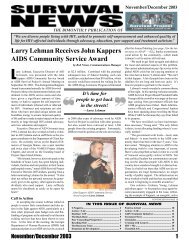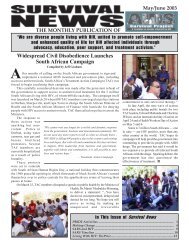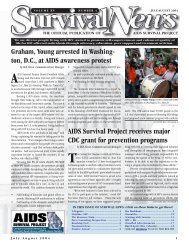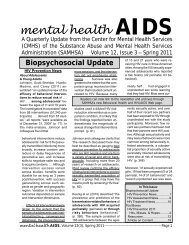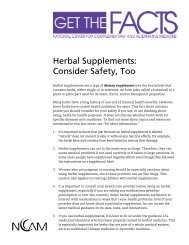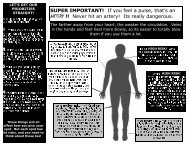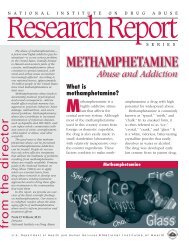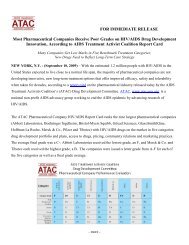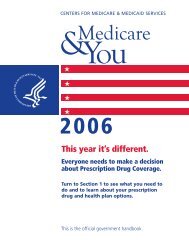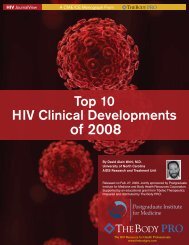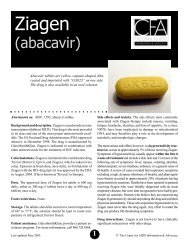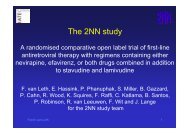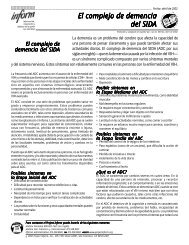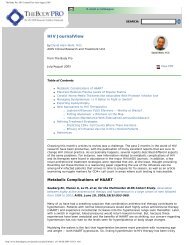here - CD8 T cells - The Body
here - CD8 T cells - The Body
here - CD8 T cells - The Body
You also want an ePaper? Increase the reach of your titles
YUMPU automatically turns print PDFs into web optimized ePapers that Google loves.
It appears, for example, that the connections<br />
between black people in the U.S.<br />
differ to some extent compared to the<br />
connections among white people in the<br />
sense that t<strong>here</strong> are more disassortative<br />
relationships, or relationships between<br />
people with different risk factors. T<strong>here</strong>’s<br />
more of a tendency for African Americans<br />
to have relationships with people who<br />
have much greater risk for HIV than they<br />
themselves do. T<strong>here</strong>’s also the issue of<br />
partnerships that overlap in time, or sexual<br />
concurrency. In addition, they tend to find<br />
partners within their communities, which<br />
are often segregated. Sexual concurrency<br />
TAmARA WILSOn, HIV-PoSITIVE SIncE 1999, VoLUnTEERS aT<br />
cHIcago womEn’S aIDS PRojEcT. SHE cREDITS HER moTHER<br />
wITH HELPIng HER To managE HER HIV, anD TPan FoR<br />
HELPIng To SaVE HER LIFE. PHoTogRaPH BY cHRIS knIgHT<br />
has been found to put people<br />
at greater risk for HIV than<br />
serial monogamy, even if<br />
people in both groups have<br />
had the same number of<br />
partners over the same<br />
period of time.<br />
THE THIng THaT<br />
is really, really<br />
important is the<br />
observation that<br />
it is the social context of<br />
life in the United States that<br />
really contributes to those<br />
partnership patterns. It’s<br />
pretty clear that black people<br />
as a whole tend to live under<br />
very different circumstances<br />
in the United States than<br />
white people do. And some<br />
of these characteristics that<br />
we have been studying, like<br />
incarceration for example,<br />
not only contribute to HIV,<br />
but they’re also emblematic<br />
of the oppression that<br />
minority populations are<br />
living under in the United<br />
States. A history of incarceration,<br />
for example, which is<br />
experienced by black men<br />
more than any other group,<br />
primarily as a result of the war on drugs,<br />
lowers the possibility of employment and<br />
increases the risk of poverty, while at the<br />
same time disrupting the stability of longterm<br />
partnerships. Incarceration and death<br />
due to violence and disease in black men<br />
lead more black women to enter into relationships<br />
with men who have greater risk<br />
factors for HIV than they do.<br />
This doesn’t mean that each and<br />
every minority, each and every African<br />
American, in the United States is poor and<br />
oppressed. But as a whole, it is these types<br />
of factors that contribute to the spread<br />
of HIV, STDs, and in fact different rates of<br />
other diseases, such as diabetes and heart<br />
disease. Black people are at greater risk<br />
of acquiring HIV infection independent of<br />
their own low-risk behavior compared to<br />
other groups.<br />
I<br />
woULD aLSo EmPHaSIzE THaT<br />
we do have personal responsibility for<br />
our behavior. However, I think some<br />
people tend to look at this work and<br />
say, “Oh, they’re just blaming the environment,<br />
blaming the majority population.”<br />
That’s really not exactly it. While we do<br />
have personal responsibility for our behavior,<br />
I think it’s very critically important to<br />
realize that black people have substantially<br />
increased risks than other populations,<br />
even with the same behavior. And this has<br />
been demonstrated. This is true for black<br />
gay men as well as for black heterosexual<br />
men and women.<br />
I would say to black women living with<br />
HIV, keep the faith. Teach your sons and<br />
daughters all the lessons you’ve learned.<br />
You have a wealth of experience, and certainly<br />
resiliency.<br />
We need to work in whatever ways we<br />
can to change the social and economic<br />
factors that are putting our people at risk,<br />
and putting our children at risk.<br />
It would help if everyone in the United<br />
States had health care. It’s astonishing to<br />
me that, apparently, health care is not a<br />
right. It remains an open question in the<br />
United States that people should have<br />
health coverage, even though it’s clearly<br />
most cost effective for the nation as a<br />
whole. This is a civil rights issue. That’s<br />
what I mean by working to change the<br />
economic factors that put people at risk.<br />
Health care availability, affordability for<br />
all, would make a huge difference in terms<br />
of transmission of HIV, and also in terms<br />
of the personal health of people who are<br />
living with HIV.<br />
go To positivelyaware.com To REaD<br />
PUBLISHED STUDIES anD aBSTRacTS.<br />
POSiTivElyAwARE.COM SEPTEMBER+OCTOBER 2012 27




